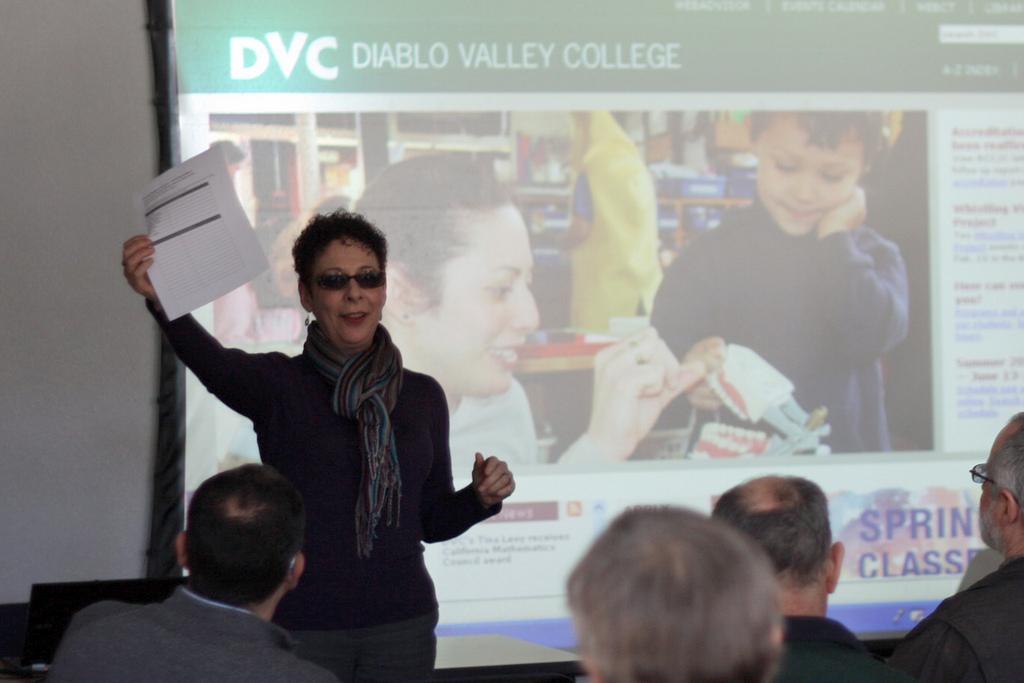New project addresses achievement gap and student stereotypes
Lisa Orta, staff development coordinator, discusses the achievement gap during a “Whistling Vivaldi” presentation on Feb. 10 in the BFL conference room. (Kate Vasilyeva / The Inquirer)
February 15, 2011
The negative effect stereotypes may have on academic ability is brought to the spotlight this semester in the “Whistling Vivaldi” project.
The program, organized by Lisa Orta, staff development coordinator, seeks to address the achievement gap at DVC through presentations, discussions, college events and film showings.
She came up with the idea after hearing a radio interview with Dr. Claude Steele, the author of the book for which the program is named. In it, Steele discussed how people internalize stereotypes about their identity and can later be affected by them.
“Whistling Vivaldi” was a technique black journalist Brent Staples used to defuse the perception that he might be a mugger while walking down the street at night. Whistling classical music helped him break the stereotype.
One example Steele used in his book involved an experiment in which questionnaires were given to three groups of Asian women just before a math test. One reminded them of their ethnic identity, another reminded them of their gender and the last did neither.
The goal was to see if the stereotypes “Asians are good at math” and “women are bad at math” would affect test scores.
The women reminded of their ethnicity performed noticeably better than the women reminded of their gender. The term Steele used to describe this is “stereotype threat.”
The achievement gap in terms of race at DVC shows Asians and whites outperforming Latinos and blacks.
Fixing the gap is especially important in California where Latinos will constitute half the working-age population in 2040, according to an Institute for Higher Education Leadership and Policy study done in October 2010.
Emily Stone of the College Success Inquiry Project feels stereotype threat is a contributor to the gap but that other factors play a role as well.
These include things such as inequality in public K-12 schooling, language barriers and low-income students often having to spend more time outside of school earning money than others.
Even if stereotype threat isn’t the whole answer, Stone thinks it can be helpful to address it. “If there’s something we can do in just our way of thinking about students and interacting with students and thinking about our own selves… then that’s pretty powerful, that’s part of how you make change,” Stone said.
Douglas Phenix, a black student and member of the CSIP, didn’t like to hear that he could succeed at school but still feel forced into those numbers.
“I went to two junior colleges before coming to DVC and I was pretty much in those numbers. I wasn’t succeeding, I wasn’t interested in class, I kind of knew what I wanted to maybe do, but I didn’t have no goal or direction, no influence, no advice from nobody…,” said Phenix.
He changed his mind mainly because of EOPS (Extended Opportunities Programs and Services) as well as support from Student Life.
“It’s the support that they actually care about your education and that makes me care more about my education… somebody’s caring about something I’m trying to do so it brings a bigger value to it. That was the biggest thing that changed for me, support and just my mind frame,” said Phenix.
For much more information, visit the Whistling Vivaldi website at: http://www.dvc.edu/events/events/whistlingvivaldi.htm






































































